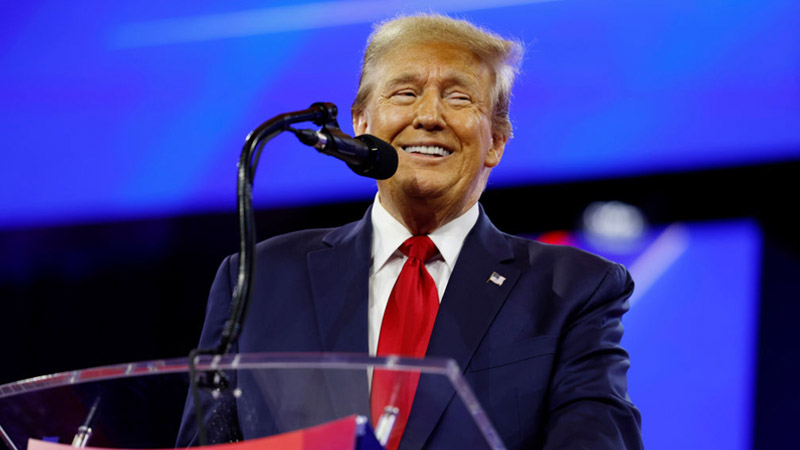Trending
In Blow To Special Counsel Smith, SCOTUS Agrees To Hear Trump Immunity Appeal

The Supreme Court granted certiorari of former President Donald Trump’s presidential immunity claim in the federal criminal case charging him for actions on Jan. 6, 2021.
The presidential immunity defense has stalled the case for nearly three months and will miss the originally scheduled March 4 trial date.
The high court’s decision automatically stays lower courts from moving forward in the case.
As Catherine Yang reports at The Epoch Times, the court also granted special counsel Jack Smith’s request that President Trump’s petition for a stay be treated as a petition for review.
“The case will be set for oral argument during the week of April 22,” the order reads.
The parties have been instructed to limit arguments to the question:
“Whether and if so to what extent does a former President enjoy presidential immunity from criminal prosecution for conduct alleged to involve official acts during his tenure in office.”
The Supreme Court’s framing combines the various questions the former president and special counsel had presented to the court.
Prosecutors argued that presidents enjoy no immunity from criminal prosecution, while defense attorneys argued that official acts of a president during his tenure are protected by presidential immunity.
Read the full one-page order from SCOTUS below:
President Trump had originally filed a motion to dismiss the case based on presidential immunity last year.
When U.S. District Court Judge Tanya Chutkan rejected the motion in December, the defense took the case to appeals court, putting the pretrial schedule in limbo.
A federal appeals court panel rejected this defense on Feb. 6, and in an atypical order withheld its mandate on the condition that President Trump take his case to the Supreme Court by Feb. 12.
Normally, the appellants would be allowed to petition for a rehearing with the whole bench of the appeals court, which might have drawn out the process for a few more months. The appeals panels expressly ordered that a rehearing petition would not stay the case.
President Trump’s attorneys then asked the high court to stay all lower court proceedings in a petition to the Chief Justice, and prosecutors responded by asking that the Supreme Court reject the petition for a stay.
Prosecutors had argued the court was unlikely to grant certiorari, as they declined to hear this same case last year when the special counsel petitioned the high court last year when the motion was appealed.
They also asked the court to schedule a hearing in March if it did grant certiorari, or review of a lower court’s actions.
The Supreme Court has dismissed the application for a stay as moot because granting certiorari would effectively halt lower court proceedings.
“Without expressing a view on the merits, this Court directs the Court of Appeals to continue withholding issuance of the mandate until the sending down of the judgment of this Court,” the new order reads.
President Trump’s briefs and any amicus curiae briefs need to be filed by March 19, and prosecutors have until April 8 to respond. President Trump can then file a reply brief by April 15, and arguments will be heard the week of April 22. A specific date for the hearing was not set.
This is the second case President Trump has brought before the Supreme Court this year.
The high court is also set to rule on whether President Trump is eligible to appear on the ballot after the Colorado Supreme Court ruled he was disqualified under Section 3 of the 14th Amendment, finding the Jan. 6, 2021 Capitol breach an “insurrection.”
Jonathan Turley said on X that “the order setting argument on immunity for April 22 is a blow to Smith on the calendar.”
“Rather than granting a stay, it has constructively created such a stay by scheduling the argument. Keep in mind, even if Smith prevails, pre-trial work must wait for the return of the mandate…
…Even if the Court issues a decision before June in favor of the government, the trial court must hash out discovery and other motions. That would push the trial closer to the November election in tension with existing DOJ policies.”
The mainstream media is distraught…
the tone in MSNBC and Andrew Weissmann is like end of the world pic.twitter.com/HdAtAcXcCH
— Andrew Fisher (@acpandy) February 28, 2024
Epoch Times’ Catherine Tang notes that the concept of presidential immunity was defined by the Supreme Court in a 1982 case where a fired military contractor sued former President Richard Nixon after he lost his job.
The high court ruled a president’s immunity from civil suit was “absolute” and that it extended to the “outer perimeter” of his office.
President Trump’s attorneys argue that his actions on Jan. 6 were part of his official duties as president, pointing to his record of taking election integrity seriously.
Prosecutors argue that President Trump has no immunity in this case because it is a criminal case.
The Supreme Court has never addressed whether presidents have immunity from criminal prosecution, making the issue untested legal territory.
President Trump’s attorneys say that to open presidents up to criminal prosecution in this way will only invite partisan retaliation by opposing administrations and opens up former presidents to prosecution for official acts.
They argued in court filings that criminal prosecutions have never been pursued against presidents in or out of office because it was understood to “dimish” the office the way a civil suit would. They added that the court has said that the proper redress would be through impeachment.
Prosecutors, meanwhile, argue that no criminal prosecutions have been brought against other presidents because Jan. 6 was unique, but a case could have been brought against President Nixon, who was pardoned.
Read the full article here


















